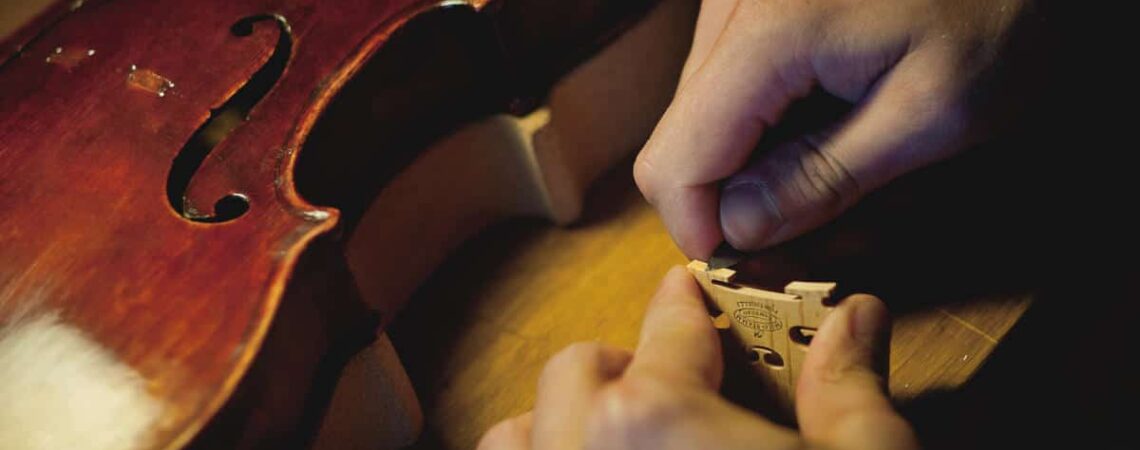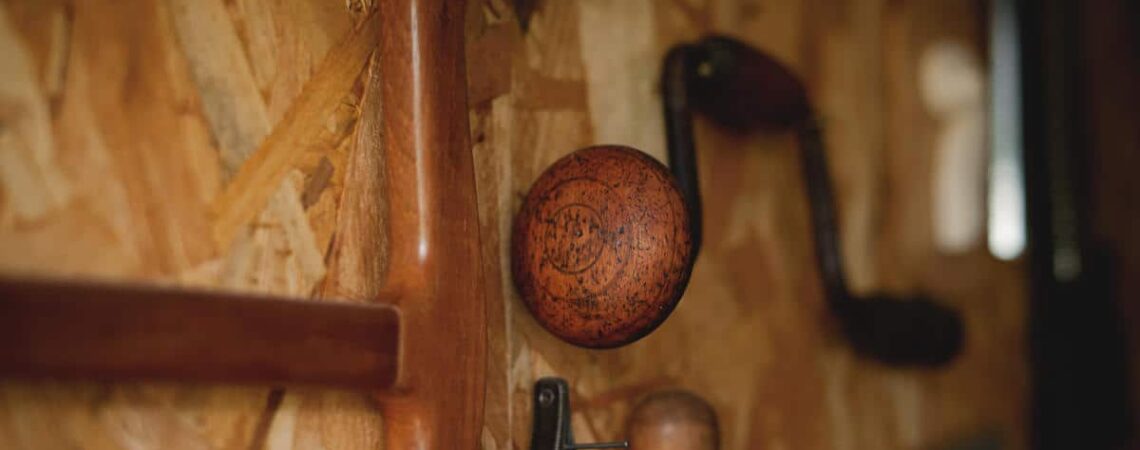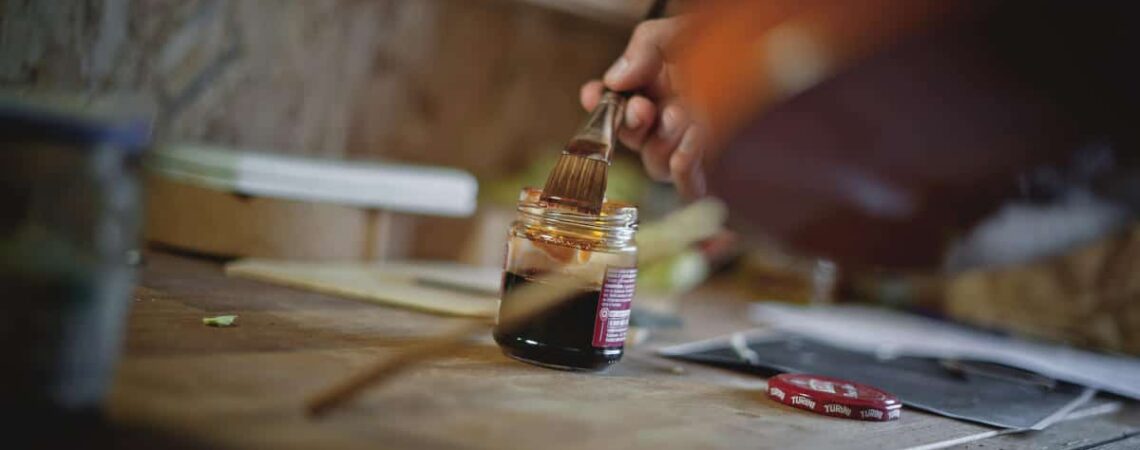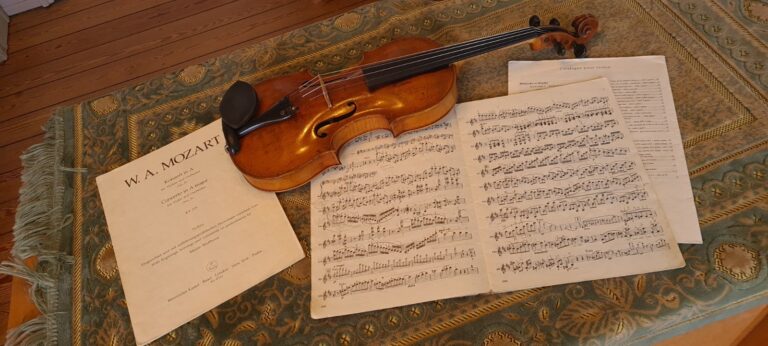I receive many questions about my professional journey to becoming a violin maker (or luthier, to be more specific). I have already worked with a number of interns showing interest in this field. And as I always have something to say on the subject, I hope this article will give you a clearer picture of the realities of the profession. In spite of the slightly misleading title, I will not be giving a detailed explanation on how to actually become a violin maker, but rather, providing reasoning on why you should not choose this career path.

Becoming a violin maker: a general overview
Because it is not a regulated profession, becoming a violin maker is actually quite simple. Indeed, anyone can call themselves a violin maker, no diploma or special certification required. All it takes is a few tools and the guts to launch a business.
The reality is that most violin makers will attend either a public or private specialized school that will help them develop the basic skills necessary to serve them in this career path.
Every future luthier will have blazed a special trail to obtain all the necessary skills. So it’s a good idea to first ask yourself: what do I want to accomplish as a violin maker?
Violin-making internships at our workshop
Learn more about internships at our workshop to unlock the universe of lutherie and even create your own instrument.
What character traits does a violin maker need?
This is a recurring question, and worth discussing. I am sure there are many different opinions on the matter, but still, I’d like to share my own thoughts on the qualities I think are necessary for violin makers. However, I am not going to discuss skills because in all honesty, nothing can really prepare you for this profession (while truth be told, any additional skills will certainly come in handy).
Passion
Loving what you do is essential. Passion will give you the necessary motivation to pursue this career path and to stay the course, as well as to confront the rigorous and challenging learning process.
Patience
This just may be the key aspect of violin making. Although it is an undervalued skill in our modern world, it should not be underestimated. Indeed, the capacity to observe and understand, to be attentive to every minute gesture, to memorize every curve of the instrument, to be able to keep perfecting and setting the bar higher; all this is essential to the profession.
Dedication
Persistance and perseverance are key, because I can tell you right now that you will have many moments of disappointment and failure. This is not because you are a failure, but rather (as the saying goes), “The master has failed more times than the beginner has even tried.” Be prepared to try…and try again.
Precision
Violin-making takes precision to whole new level. There is hardly any room for approximation and even if sometimes there is some, you need to quickly train your eye and your fingers to work at the highest level of precision possible.
Perfection
I can already tell you that perfection does not exist in this profession. However, you always need to attempt it. Do your best and continue striving for improvement.
Language skills
I am not sure if this is a skill or a trait, but nevertheless, be open to the world, languages, travels and encounters. If not, this will put many obstacles in your path. Gain fluency in English, which is the universal professional language. This will unlock endless sources of knowledge, opportunities and personal contacts all around the globe.
If you posses all of these traits and skills, you undoubtedly have what it takes to become a violin maker. If you do not have every single one, there is nothing preventing you from taking the time to develop them.

Journey of a violin maker
What do you think that a violin maker actually does day in and day out?
Do you think there is an archetype that everyone emulates in the hopes of having successful career? Actually, there is one, and it has to do with education and transmission. Previous generations provide us with a framework for the next generation to build upon, and this is continuously passed down. This model worked perfectly for centuries, but does it still hold up in our modern world? As much as violin-making is a profession that conveys a great respect for tradition and cultural heritage, it must also be able to adapt to the frenetic development of modern society.
It is normal to be influenced by the values and customs of our teachers. However, it is important to be able to take a step back and integrate a variety of influences that correspond to our unique personalities and values. By doing so, it will be far easier to find your place in the world of violin making and, most importantly, to feel at home in the profession.
Making a living as a violin maker
When we choose a career path, it is indeed crucial to consider the financial realities in order to be able to continue. It’s ideal of course to be able to live comfortably. I often hear things like, lutherie is fantastic or it’s a work-passion. In other words, many people think that violin makers are happily living their dream jobs every day in a quiet workshop, surrounding by the pleasant aroma of wood and hot glue. These observers probably imagine that we spend our time tirelessly observing all the different shapes appearing in the swirls of the instrument handles with persistent, dreamy expressions on our faces.
Passion is good, but in my opinion, this is not the profession that will fill your cup with it. It is a sort of pre-existing passion, tenacity, openness and courage that will give you the strength need to continue on this path. As with any journey, there will be many obstacles, particularly in this field (but nothing too dramatic).
The skill set of a violin maker
In many cases, violin making is a highly individualistic profession. It is also very personal, and there are many ways to develop in this career. With that in mind, here are some ways in which artisans can make a living:
- Instrument making
- Instrument accessory making
- Instrument repair
- Instrument restoration
- Instrument assemblage
- Instrument adjusting
- Bow rehairing and maintenance
- Instrument rentals
- Trading instruments and accessories
- Instrument expertise
- Teaching
- Consulting for music manufacturers
- Sales representative
- …and for everything else, the sky is the limit.

Becoming a violin maker today
As I’ve mentioned before, joining a specialized school is basically a requirement (I will create a list of options in another article).
These schools won’t turn you into a violin maker. But they will provide you with a basic foundation that could help you land an internship or a first job in which you will learn from more experienced craftsmen. Although some individuals decide to start solo careers right out of school, it is a much riskier process.
Tools for the luthier’s apprentice
Here are some useful tools that will ensure your career in violin making gets off to a good start:
Pros and cons of lutherie school
As I mentioned previously, attending a specialized lutherie school will not hand you all the keys to success. In fact, most of them won’t even ensure employment, which is a bit ridiculous. Before deciding which school to attend, it’s important to consider exactly what you’re looking for and research what you will be learning at each establishment. Your ultimate choice needs to fit your personality as well as your career objectives.
Generally speaking, until you are out of the protective school bubble, it is difficult to fully come to terms with the economic realities you’ll be faced with out in the real world.
What an employer looks for
Obviously, an employer looks for someone with motivation and dedication, but that is not all. Some skills are absolutely required to land a job in a workshop. In my opinion, these are the skills you will need to develop during your studies:
- Capacity to fully assemble violins, violas and cellos at a professional level and at a reasonable pace.
- Capacity to carry out basic repairs and restorations on your own at a reasonable pace.
- Capacity to perform basic repairs on an instrument (changing strings, tuning, etc.).
What turns off an employer…
…and what schools waste time teaching: how to make instruments.
It is important to know how to make violins, violas and cellos. The process trains you on how to use multiple tools and gain and understanding of how the various pieces are assembled while gaining the necessary woodworking skills for the job. But even if showing your hand-crafted violin is more valuable than the most competitive resumé, you will rarely land a job for it. Worse still, many work contracts will even prevent you from making your own instruments.
Be careful: some courses will require you to make several instruments without stain, assembly, or varnish.
With this in mind, I advise you to pay attention to the educational program before settling on your choice. Additionally, you can always complete your education with internships or with personal projects. This is why I offer professional training internships.
[blog_posts ids=”24931″]
How to choose your school
If I had to give you advice based on personal experience, here are some important criteria for selecting your school:
- Do not attend a school located in your home country. Take this opportunity to learn a new language and culture, and to meet people from around the world.
- Bond with your classmates. Build relationships with your peers; this is where your professional network begins.
- Pick a school with a well-rounded curriculum. In other words, choose a school that will teach you all the different aspects of modern violin making, including manufacturing, repair, restoration, assembly, varnish, and if possible, one that includes internship opportunities.
- Create an employment or business plan well before you graduate. Develop your network, adapt your knowledge and sharpen your skills.

Notes for the future violin maker
If you walk through the front door of any violin maker near you (or even far away), you will often be met with a rather cold reaction when you share your professional goals. Trust me when I say that this is completely normal. I had the same reactions at the beginning of my career and still hear similar stories from colleagues today.
The reality is, there are too many violin-makers, and it seems that there are more and more of them. Nowadays, it is becoming a very competitive field to be in with the Internet and its huge online retailers, amateur violin makers, an increasing number of workshops in urban areas, and finally, fewer and fewer string musicians.
How to become a violin maker, regardless?
If I have scared you a bit, I see that as a good thing. Although this career path may not be as terrible as I’ve made it sound, my hope is to open your eyes to a certain reality. Read and research the profession as much as you can before making any decisions. Then, compare your findings to your personal goals; only you can be the judge.
The first test is to be persistant from the start. Because if you give up the moment any difficulty arises, it is a sure sign that it would be wiser to choose another career path. If you give up too easily, you will not be able to thrive in this profession.
In future articles, I will be addressing topics that discuss violin making from an economical point of view, providing for example a simplified budget forecast for a violin workshop.
In the meantime, if you have additional questions, I encourage you to share them on social media. You are also welcome to contact me by email or phone.




